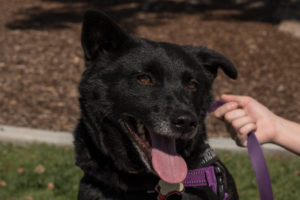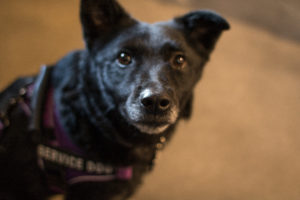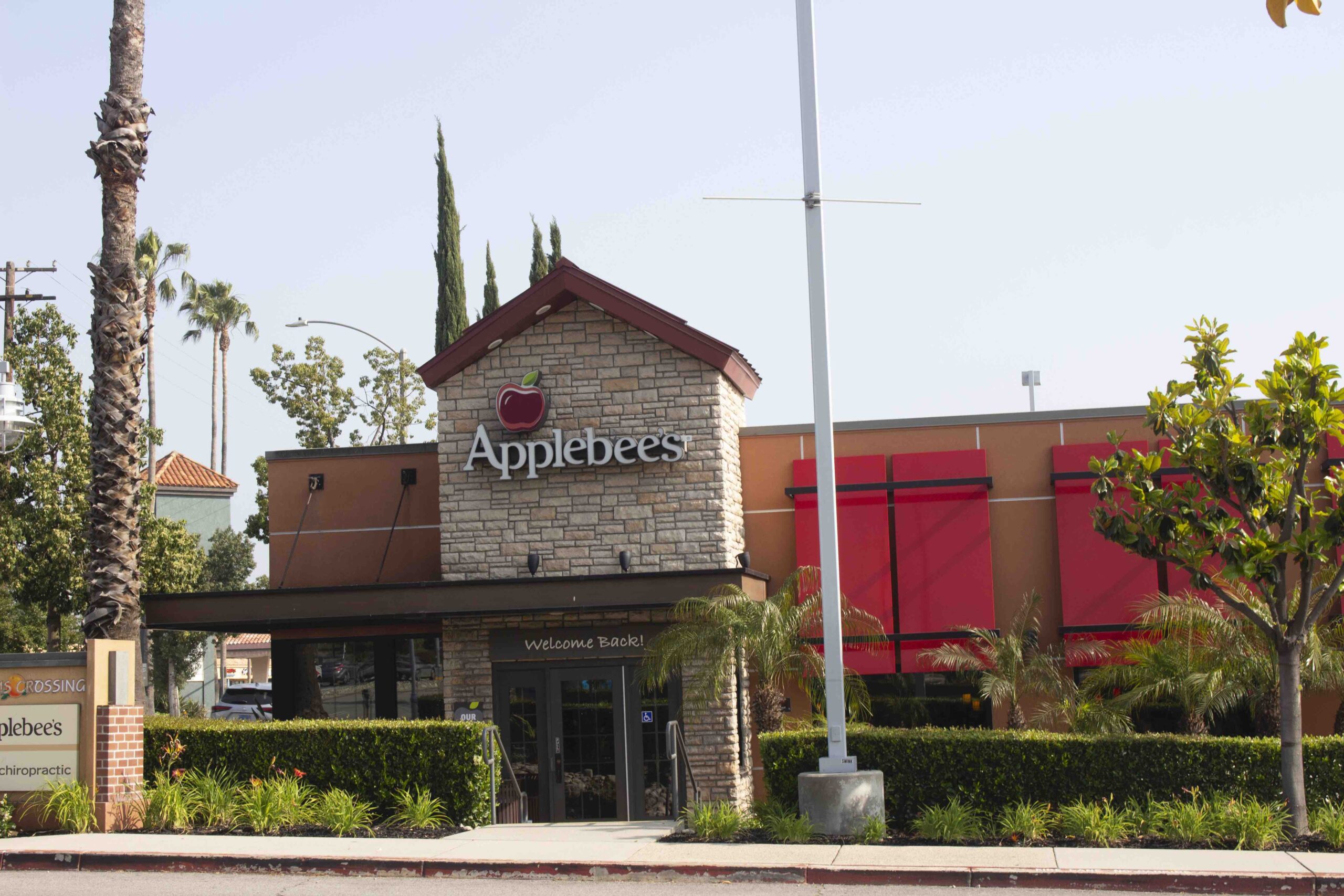Opinion: Helping Hound: Life with a service dog
It’s 8:30 a.m. and my alarm goes off. My mind is awake, but my body is slow to react.
I cannot move.
Unable to open my eyes, the world is dark. After a vivid dream, the darkness and alarm is jarring.
Luna immediately comes to the top of the bed and paws at me gently. I remember I am not alone. When this doesn’t wake me, she begins to shove her face under my pillow and root around, snuffling. This helps me not to panic. I start to chuckle and remember to wiggle my toes. The sleep paralysis begins to lift, and I’m finally able to turn off my alarm.

Photo by: Jacqueline Torres
Luna sits in front of the Monrovia Library Park on March 27, 2018. Luna was adopted by Alana Daly in 2016.
I adopted my dog as “Miss Sassy” from the Pasadena Humane Society on July 2, 2016 to be my emotional support animal. After training at home and in classes, she learned tasks to help me both at home and in public as a psychiatric service dog.
Last semester, I began taking Luna with me to school. An official at Disabled Students Programs and Services stated that there is at least one very active service dog on campus, and many that are not registered with the office. Monica Christianson, Ed. D. of the Veterans Success Center said, “We don’t have any right now, but we have in the past.”
As service dogs are becoming more common, students and teachers have asked for some guidelines on how to interact with the dogs and handlers.
The main issue is that people see pets in public, instead of working dogs on duty.
Although service dogs are well-trained and well-behaved, distracting them is a serious matter. When service dogs lose focus, they can no longer properly alert the handler to health and safety issues.
Hailey Ashmore, a 17-year-old from Dallas, could have died when she visited her dad at work and an employee ignored the red “STOP” patch on her service dog Flynn. Flynn usually alerts Ashmore ten minutes before a seizure, but because of a stranger’s affection he wasn’t able to alert his handler; she suffered a severe seizure and sustained rug burns on her face.
Flynn was in training, a process that never truly ends with service dogs. Many dogs are incredibly friendly, but giving them too much attention can be dangerous to the handler and detracts from their work in a public place.
To be designated a service dog, the dog must be individually trained to perform tasks to assist the disability of their owner. This could be a physical, sensory, psychiatric, intellectual or other mental disability. Service dogs are not required to have any identification. Always assume a dog on campus is working, and act respectfully by giving them space.
Legally, only two questions can be asked of a handler. “Is the animal required because of a disability?” And “What work or task has the animal been trained to perform?” Asking further questions about a person’s disability is often offensive and frankly nobody’s business.
Last year, I took Luna for a quick trip to the grocery store. We had no issues until I was in the checkout line, where I overheard the couple behind me arguing on whether or not it was acceptable to approach us. Without asking, the husband began petting Luna and insisted it was “part of her training.” This is false, as any contact without clear permission from the handler breaks protocol. Luna instantly rolled over for belly rubs, something not acceptable and difficult for me as her handler. The couple further reinforced this behavior by cooing over her, the husband giving her even more attention, all while peppering me with questions about my disability.
Luna is a friendly and submissive dog, and this behavior makes it more difficult to distinguish when she is working. While admittedly adorable, Luna submitting to affection from a strange man in a grocery store is not a habit to encourage.
At school, Luna is training to alert me to take medication or discreetly leave class before having a panic attack.
Training varies depending on the type of service dog and the animal’s disposition. On campus, I have seen a handler with two dogs; this is common, as a trained service dog often teaches a younger dog in training how to act in public.
After 2 years of obedience training, seizure alert dogs are taught to remain close during a seizure, prevent an injury by staying close to the owner, or fetch a telephone or medication. Psychiatric service dogs are often taught deep pressure therapy, applying their body weight to the handler to physically relieve anxiety and calm the handler.

Photo by: Jacqueline Torres
Service dogs in public are expected to be able to sit on command and be well mannered. Remember that service dogs are trained, but this training never ends and is a daily process of correcting and reinforcement. Please respect the boundaries handlers impose on their dogs.
It is important to note that it is never OK to offer food or too much attention to a service dog. Many dogs are treat motivated, and this can reinforce bad behavior. Luna, on the other hand, is attention motivated and friendly people can easily break her focus.
By asking ahead, you can even help reinforce training and good behavior. Approach with caution and ask the handler if you can pet the dog, perhaps after class. Speak to the handler directly, and avoid prolonged eye contact or baby talk with the dogs as this often switches them away from “work mode.”
For further education I have compiled a list of things you should and should not do when a service dog is on duty.
Do and Do not:
Please do not distract the dogs at work. Students are in class to focus, and this includes the handler. Service dogs are still animals getting accustomed to constantly changing environments with many distractions.
Do ignore service dogs in class. This may seem cold, but the dogs are there to assist a student and not for show-and-tell.
Do not stare at the dog during the entire class. If the class is boring you, find a different distraction. Dogs will notice and expect attention; prolonged eye contact will change their focus.
Do not touch service dogs without permission. It’s okay to ask- especially if there is an “Ask to Pet” patch. Sometimes it can help training to reinforce good behavior with attention or a treat after class. Prepare to hear “no.” Answers will vary with every handler every day, depending on the behavior of the dog- don’t take it personally.
Do continue discussions in class with the handler. This is still a fellow student hoping to participate equally in class. Please treat handlers with sensitivity and respect our personal space.
Do not offer food to a service dog. Dogs, like people, have varied diets and allergies. Food is the ultimate distraction for working dogs.
Do speak up if you have an allergy or fear of dogs. We don’t want to make anyone uncomfortable or unwell, and can arrange seating to accommodate everyone without offense taken.



